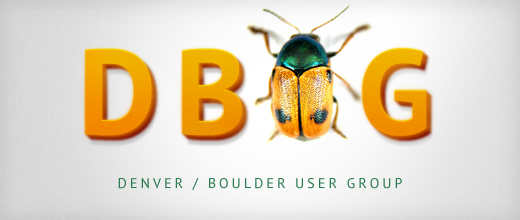
This month's Denver Drupal Meet Up took a step back and looked at the larger picture of project management. Matthew Saunders, or MatthewS in the Drupal world, talked about the lessons he has learned working as a project manager. His experience in Drupal spans back as early as Drupal 4 and he has played a major role in the development of Drupal since. It was great to hear his thoughts on what works and what doesn't when it comes to projects in Drupal.
Before Matthew's presentation, attendees went around the room and named topics they would like to see at future DBUG Meetups. If you live in the Denver area and see a topic on here you would like to present on or lead a discussion around, get in touch! We're always looking for people to share their Drupal knowledge with the community.
Here are some of the most popular topics listed:
* Panels and Page Manager
* Entity Fields
* Form API
* OpenLayers and mapping in Drupal
* Customizing the backend UI
* Working with Views handlers and plugins
* DevOps
* Performance Tuning
* Responsive Design in Drupal
* The Human Side of Drupal- handling failure and managing conflicts
Drupal
Drupal Planet
Agile Gymnastics and Timebox Tumbling
Matthew started out with an important reminder that the way developers communicate is very different from our clients. Whereas in other professions it is common to build relationships with one another through face to face interactions, much of the communication between Drupal developers is text-based (IRC, email, ticketing systems). It's important to remember this distinction and meet clients where they are at, which might mean putting in more face time than one is accustomed to. It is essential that we remain on the same page as clients. Practically speaking, this means a lot of repeating back to a client what they are asking. Oftentimes clients don't say exactly what they truly want and requests oftentimes get lost in translation. We then went through the three major approaches to projects: Cowboy, Waterfall, and Agile. To sum things up, Cowboy can be a very effective way to get a lot done in a short amount of time if there is a great deal of trust in the development team from the client. It requires a client to hand over a great deal of control to developers and feel confident that the work will get done. Waterfall is a just plain bad approach to Drupal development because of the constantly evolving state of Drupal. Matthew definitely favors the Agile approach and we were able to dive in and see the innards of just how Trellon, where he is CTO, implements this. Finally we talked about team dynamics. The less internal hierarchy within a team the better. Hierarchy creates relationships in which certain people are afraid to speak up, which translates into fewer valuable perspectives being at the table. Certain approaches which could be improved are pushed through, self-awareness suffers, and the agency of certain team members is stifled. It's also essential that projects are structured to minimize context switching as much as possible. When developers are allowed to focus on a certain project, they avoid the lost time of getting one project at a stopping point, bringing up the environment for a new project, and becoming familiar with the greater context in which someone is working. Finally, a no blame culture translates into a smooth running team. The more that teammates are friends, the better. And while there are bound to be moments of tension or difficult moments, an overall positive approach is key for a company to be able to work in a more non-hierarchical manner in which members can trust one another to get the job done. Being able to step back and look at the process in which we work with Drupal was a huge help for me. In December, we at Aten will be having our yearly retreat. A lot of the points Matthew made in his presentation will certainly be brought up as we look at ways to continue to improve our own workflow and the way we manage projects. If you were at the meetup, what points did you walk away with? If you weren't there, what are some of the key lessons you have learned to make projects run smoothly?Read This Next
- Simplified Drupal Views Styling with Custom Style Plugins
- Leveraging Laravel to Modernize Guttmacher Institute’s Database
- Enhanced Bot Protection with Cloudflare
- The Hidden Costs of Choosing Budget Hosting for Your Drupal or WordPress Website
- Syncing Drupal and React for a Custom Interactive Map for Tampa International Airport
Skip to footer
Comments